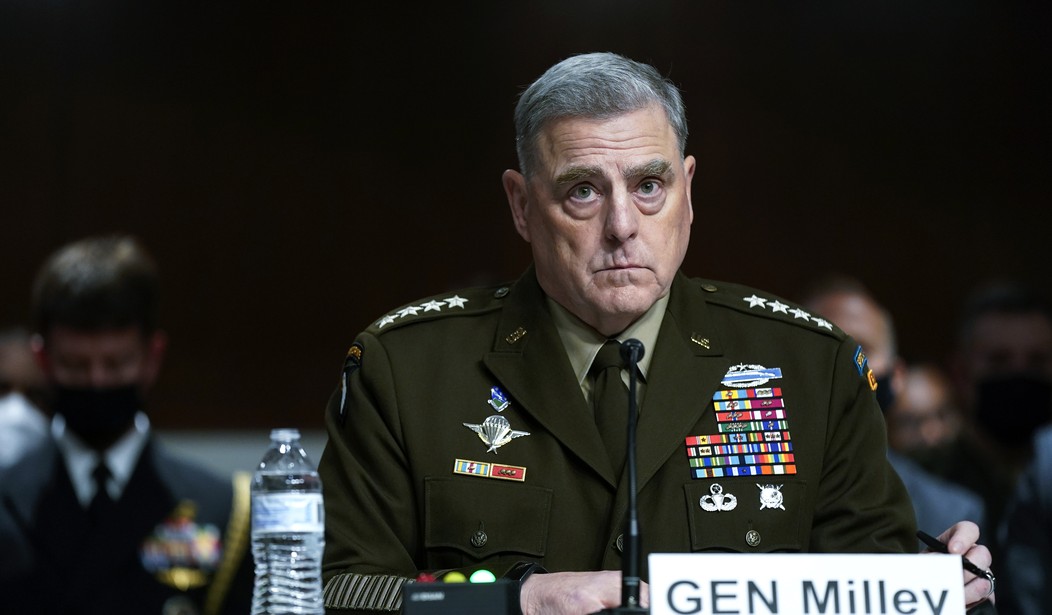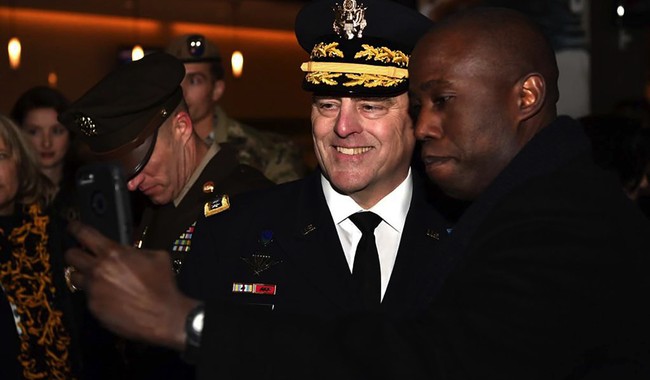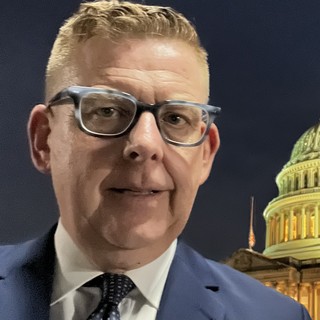Army Colonel J6 Witness: 'Milley Is the Don Barzini of the Deep State'

The colonel and Army lawyer challenging the Army's official narrative of the events and leadership decisions during the Capitol Hill protests on Jan. 6, 2021—a narrative relied upon by the Colorado Supreme Court when it struck President Donald J. Trump from the ballot — told RedState then-Chairman of the Joint Chiefs of Staff Gen. Mark A. Milley was the black hand operating outside his legal authority to delay the District of Columbia National Guard from responding the protests that day.
“Milley is the Don Barzini of the Deep State," said Col. Earl G. Matthews, the Harvard Law School graduate, who was the senior legal advisor to Maj. Gen. William J. Walker, the D.C. National Guard's commanding general from March 2018 through April 2021.
“He's the most powerful chairman of the joint chiefs in history,” Matthews said. “It was Milley all along, and I didn't realize it. Milley was manipulating this entire stuff from point start.”
The former Guardsman, now serving in the Army Reserve, said that as the joint chiefs chairman, Milley had no legal role in the chain of command; he was simply the president's senior military advisor. However, Milley leveraged his staff in the Pentagon and exploited his relationships with other generals he mentored and favored for promotion so that he ran the Army as his own feudal possession.

"Milley controlled the Army,” Matthews said.
"The problem was not with Donald Trump; it's Mark Milley and the Army leadership in control. They stopped the Guard from coming then lied about it and said the Guard acted at sprint speed," he said.
“This is about civilian control of the military,” he said. “There was none. There is none. I argue that — Mark Milley had more control over the D.C. Guard on Jan. 6 than Donald Trump did — if Donald Trump wanted to call the Guard to go to the Capitol, Milley wouldn’t let him do it,” he said.
Milley modeled himself after Maj. Gen. Fox Connor, the general who mentored Gen. Dwight D. Eisenhower and other general officers, he said.
“When I was with him, he used to always quote Fox Connor,” he said.
“He admired Connor. He felt like he was an incarnation of Fox Connor, so there were certain generals he was advancing. McConville was one. Flynn was another; another was Walter Piatt, who worked for Milley on numerous occasions," he said.
Retired Gen. James C. McConville succeeded Milley as Army chief of staff from 2019 to 2023. Gen. Charles A. Flynn, brother of retired Lt. Gen. Michael T. Flynn, is now the commanding general of the U.S. Army Pacific. Retired Lt. Gen. Walter Piatt was the director of the Army Staff on J6, and he retired in 2024 after his fourth star and assignment to lead U.S. Army Futures Command was shelved over concerns he could not get Senate confirmation because of his own J6 role.
Milley's relationship with Piatt was cemented by the fact both men were commanding generals of the 10th Mountain Division, so, through Piatt, Milley exercised control of the D.C. National Guard and the Army as if Secretary of the Army Ryan D. McCarthy was just a bystander, Matthews said.
He said that McCarthy was a former Army Ranger captain who naturally deferred to Milley.
The colonel said it is essential to understand that, unlike the National Guards in the states and territories in the nation's capital, the National Guard is not controlled by a governor; instead, it is under the president's direct control. In practice, Trump and other presidents delegated active control of the D.C. National Guard to the Army Secretary.
Matthews said Milley was always joking about this unique command and control structure. "When Milley would call over, he would always say: 'I've got your governor on the line,' which meant it was McCarthy."
Milley delayed the D.C. National Guard’s response to J6
Matthews said he was with Walker throughout J6, and the D.C. National Guard was poised to respond to the crisis on Capitol Hill, but the Army’s official record does not align with what he witnessed and experienced that day.
For most of the crisis, he said the Guard was ordered not to approach the Capitol beyond 9th Street, which is the block where the FBI headquarters sits.
One prime example is McCarthy’s testimony that he tried Jan. 6, 2021, to call Walker to talk to him about mobilizing his Guardsmen at 4:35 and 5 p.m., which was relied upon by Professor William C. Banks in his testimony at the Colorado court proceedings that led to Trump’s removal from the state’s primary ballot, he said.
Matthews said Walker turned over his phone to prove McCarthy did not call him.
“The Army lied about it. Walker actually pulled the phone calls,” he said. “McCarthy didn’t have any record of the call, so those calls didn't exist.”
The colonel said Walker tried to set the record straight in his own March 2021 testimony when he appeared before the House Select Committee on the January 6 Attack.
Walker told the committee that he watched at 1:30 p.m. as Metropolitan Police officers mobilized to support the Capitol Police officers, and then Capitol Police Chief Steven Sund called him.
At 1:49 p.m., I received a frantic call from then Chief of U.S. Capitol Police Steven Sund, where he informed me that the security perimeter at the Capitol had been breached by hostile rioters. Chief Sund, his voice cracking with emotion, indicated that there was a dire emergency on Capitol Hill and requested the immediate assistance of as many Guardsmen as I could muster.
Immediately after the 1:49 p.m. call with Chief Sund, I alerted the Army senior leadership of the request. The approval for Chief Sund’s request would eventually come from the Acting Secretary of Defense and be relayed to me by Army senior leaders at 5:08 p.m. – three hours and 19 minutes later. We already had Guardsmen on buses ready to move to the Capitol. Consequently, at 5:20 p.m, (in under 20 minutes) the District of Columbia National Guard arrived at the Capitol. We helped to re-establish the security perimeter at the east side of the Capitol to facilitate the resumption of the Joint Session of Congress.
He said that despite this delay, Milley told reporters the Pentagon reacted to the Capitol Hill protests with sprint speed.
“I'm saying that his people delayed us, but Milley is in the center of everything, making the decisions—no question about it,” he said.
Matthews said when he and Walker arrived at the Capitol grounds to observe the deployment of the Guardsmen. “It was already dark, and listen, the D.C. Armory is 1.8 miles away, and there were New Jersey state troopers there before the D.C. Guard.”
The colonel said the National Guard responded quickly and effectively to the George Floyd riots in Washington in the summer of 2020 and that before J6, Guardsmen on alert were issued riot gear and instructions, so there was no need to report to the armory before forming up at the Capitol. “We pivoted quickly in the George Floyd; we should have done the same thing on Jan 6.”
National Guard facilities and headquarters are often called armories, a legacy of the force’s roots in civilian militias that held weapons, ammunition, and gunpowder in a single location.
Matthews said when he spoke up to defend Walker and the record as he lived it, he went from being colonel-promotable, meaning he was on the list for brigadier general, to being shunned by peers and leaders and with little chance of pinning his first star.
“They lied in front of Congress to claim they moved quickly, but they didn't—they could have moved much quicker,” he said.
“I got retaliated against. That's the bottom line,” he said.
“I love the Army, but I'm thinking about resigning, not because I'm quitting,” he said. “I want to stay in the Army — I'm going to resign because I lost faith in leadership — I'm thinking about that — I haven't decided yet.”
Matthews: Milley spooked by optics of Soldiers restoring order
Matthews said Milley was emotionally scarred by the reaction to his appearance with Trump in front of Washington’s St. John’s Episcopal Church the morning after leftwing protesters tried May 31, 2020, to set the church aflame.
In fact, Milley apologized for standing with Trump against the arson attempt on the historic house of worship.
“I can say that he got beat up for being at St. John's Church,” he said. “I mean, it was ballsy of him to say: ‘I shouldn't have been there,’ because I thought the president could fire him.”
When J6 went down, Milley was not trying so much to kneecap Trump or support the protesters; instead, his concern was the appearance of the Army participating in the political process, he said.
Milley was then put on notice three days before J6; he said all 10 former secretaries of defense posted an op-ed in The Washington Post warning the Pentagon leadership against intervening in the political process.
Matthews said while Walker testified that the Army leadership was obsessed with its image, not the Capitol Hill protests, he heard it from them himself.
“Both McConville and McCarthy emphasized that to me and General Walker. We had a meeting about it — Milley talked about it, too,” he said. “They care about the perception. They didn't want to be seen as doing anything like they were working with Trump.”
One problem with that logic is that it is the mission of the National Guard to respond to civil disturbances, he said.
“They believed there should be no military presence on the Hill in the interest of democracy, but the National Guard responds to riots.”
Milley and his crew have largely retired, and there is a need for the military to regain the trust of the American people. What's currently going on, though, isn't helping.

No comments:
Post a Comment